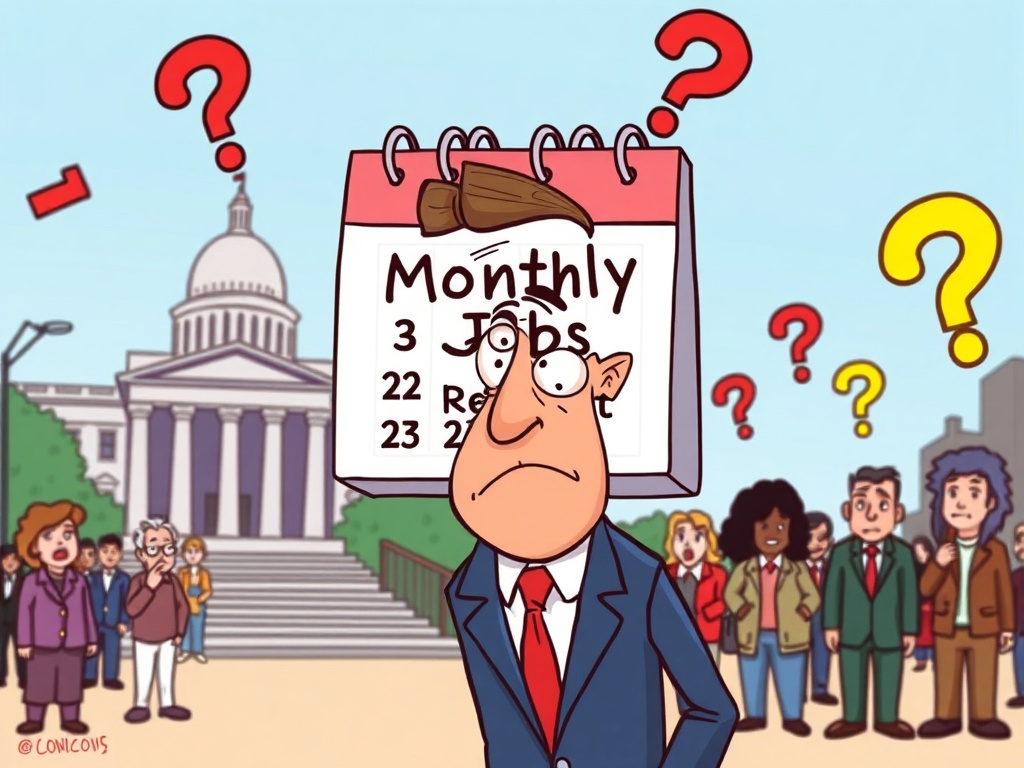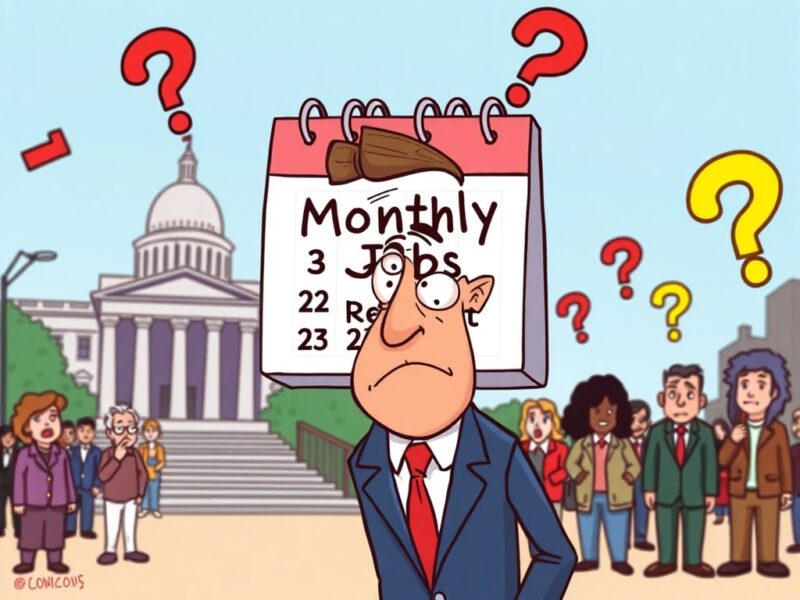BitcoinWorld

BLS Nominee’s Bold Proposal: Why Ending Monthly Jobs Reports Sparks Alarm
A significant development is stirring discussions in economic circles: the recent suggestion by a BLS nominee to potentially discontinue the regular release of monthly jobs reports. This proposal has immediately raised eyebrows, particularly among those who rely on consistent economic indicators to gauge market health and ensure economic transparency. For anyone tracking global markets or understanding policy shifts, this news is worth a closer look.
Who is the BLS Nominee and What Was Suggested?
E.J. Antoni, President Trump’s nominee to lead the Bureau of Labor Statistics (BLS), is at the center of this conversation. Antoni, who serves as chief economist at the Heritage Foundation, reportedly suggested stopping the monthly release of these crucial employment reports. Fox Business initially reported this, citing Walter Bloomberg on X. This suggestion brings a new dimension to how we might access and interpret vital employment data in the future.
What exactly does this mean? The Bureau of Labor Statistics is a principal federal agency responsible for measuring labor market activity, working conditions, and price changes in the economy. Its data is foundational for policymakers, businesses, and the public alike.
- E.J. Antoni: Nominee for BLS head, chief economist at Heritage Foundation.
- The Suggestion: To halt the monthly release of employment reports.
- Source: Fox Business, as reported by Walter Bloomberg on X.
Why Are Monthly Jobs Reports So Crucial for Economic Transparency?
The monthly jobs reports are far more than just numbers; they are a vital pulse check on the nation’s economic health. These reports provide timely and comprehensive employment data, including unemployment rates, job creation figures, and wage growth. Investors use this information to make informed decisions, businesses strategize based on labor market trends, and policymakers rely on it to formulate effective economic policies.
Without these regular updates, a significant void could emerge in our understanding of the economy. This could lead to:
- Increased market volatility due to uncertainty.
- Challenges for businesses in planning hiring and expansion.
- Difficulties for policymakers in responding to economic shifts.
Ultimately, the consistent availability of this data is a cornerstone of economic transparency, allowing for informed public discourse and accountability.
What Are the Potential Impacts on Employment Data and Labor Statistics?
Halting the monthly jobs reports could have profound implications for how we perceive and react to changes in the labor market. The Bureau of Labor Statistics provides a benchmark for understanding the state of American workers. If the frequency of these reports changes, or if they are discontinued entirely, the accuracy and timeliness of our labor statistics could be compromised.
Consider the ripple effects:
- Market Confidence: Less frequent data might erode investor confidence, as they lose a key tool for risk assessment.
- Policy Formulation: Policymakers would operate with less up-to-date information, potentially leading to delayed or less effective interventions.
- Public Understanding: The general public would find it harder to grasp the true economic landscape, impacting personal financial planning and overall sentiment.
The reliability of employment data is paramount for maintaining a stable and predictable economic environment.
Navigating the Future of Labor Statistics: Challenges and Insights
The suggestion to end monthly jobs reports presents a significant challenge to the established methods of economic analysis. While the precise reasons behind Antoni’s suggestion are not fully detailed in the initial report, any move to reduce the frequency or scope of critical labor statistics would inevitably spark debate. Maintaining robust and transparent data collection is essential for a functioning economy.
It is important to understand that comprehensive and timely employment data enables proactive decision-making. Should such a change occur, it would necessitate alternative methods for tracking labor market trends, potentially increasing reliance on private sector data or less frequent government reports. This could introduce inconsistencies or delays in economic insights, impacting everyone from individual job seekers to multinational corporations.
The discussion around this proposal highlights the critical role that independent statistical agencies like the BLS play in providing objective economic information. Ensuring the integrity and accessibility of this data is vital for national economic stability.
Summary: The Ongoing Debate Over Economic Data Transparency
The suggestion by BLS nominee E.J. Antoni to potentially end monthly jobs reports has ignited a crucial conversation about the future of employment data and economic transparency. These reports are foundational for understanding our economy, guiding policy, and informing market decisions. Any alteration to their release schedule could have far-reaching consequences for investors, businesses, and the general public’s understanding of labor statistics.
As this nomination process unfolds, the focus remains on the importance of consistent, reliable, and accessible economic information. The debate underscores how deeply intertwined robust data is with a healthy, predictable economic environment.
Frequently Asked Questions (FAQs)
1. Who is E.J. Antoni?
E.J. Antoni is President Trump’s nominee to lead the Bureau of Labor Statistics (BLS) and currently serves as the chief economist at the Heritage Foundation.
2. What controversial suggestion did E.J. Antoni make?
He reportedly suggested stopping the monthly release of employment reports, which are key indicators of the nation’s economic health.
3. Why are monthly jobs reports considered important?
Monthly jobs reports provide critical employment data, including unemployment rates and job creation, which are vital for investors, businesses, and policymakers to make informed decisions and maintain economic transparency.
4. How might ending these reports impact economic transparency?
Discontinuing these reports could reduce the public’s access to timely economic information, potentially leading to increased market uncertainty, challenges in policy formulation, and a less clear understanding of labor statistics.
5. What is the Bureau of Labor Statistics (BLS)?
The BLS is a principal federal agency in the U.S. responsible for measuring labor market activity, working conditions, and price changes in the economy, providing essential labor statistics.
If you found this article insightful, consider sharing it with your network! Stay informed on critical economic discussions by sharing this piece on your favorite social media platforms.
To learn more about the latest economic data trends, explore our article on key developments shaping labor statistics and their impact on future policy actions.
This post BLS Nominee’s Bold Proposal: Why Ending Monthly Jobs Reports Sparks Alarm first appeared on BitcoinWorld and is written by Editorial Team





